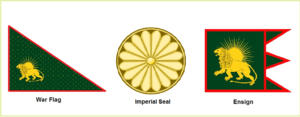This article has multiple issues. Please help improve it or discuss these issues on the talk page. (Learn how and when to remove these messages)
|
The Mughal Empire had a number of imperial flags and standards. The principal imperial standard of the Mughals was known as the alam (Alam علم). It was primarily moss green.[1] It displayed a lion and sun (Shir-u-khurshid شیر و خورشید) facing the hoist of the flag. The Mughals traced their use of the alam back to Timur.[2]

The imperial standard was displayed to the right of the throne and also at the entrance of the Emperor's encampment and in front of the emperor during military marches.[2]
According to the Ain-i-Akbari, during Akbar's reign, whenever the emperor rode out, not less than five alams were carried along with the qur (a collection of flags and other insignia) wrapped up in scarlet cloth bags. They were unfurled on the days of festivity, and in battle.[3] Edward Terry, chaplain to Sir Thomas Roe, who came during the reign of Jahangir, described in his Voyage to East-India (1655) that the royal standard, made of silk, with a crouching lion shadowing part of the body of the sun inscribed on it, was carried on an elephant whenever the emperor travelled.[4][5]
A painting by Payag in a manuscript of the Padshahnama, a chronicle on Shah Jahan's reign, preserved in the Royal Library, Windsor Castle depicted the Mughal standards as the scarlet pennons with green borders with a passant lion and rising sun behind it.[6] Another painting in the same manuscript depicted the Mughal standards having green fields with a couchant lion and rising sun behind it.[7][8]
Types of flags
editThe Mogul had two known flags, both of the Mughal green color.
- The first known flag was rectangular and contained 3 Crescent and possibly a sun. It represented the absolute monarchy of the Mogul. This flag was known as "Flag number 214".[citation needed]
- The second flag featured an unarmed lion on the flag, which represented Imam Ali in a prayer known as the Nad-e-Ali along with the tree of Karbala which may have been mistaken for the sun, known as Khurshid, which represented the motherland. This flag was known as "Flag number 215".[citation needed]
Seals
edit-
Imperial seal of Mughals
-
Seal of Shah Jahan
-
Seal of Shah Jahan
-
Seal of Jahangir
-
Seal of Aurangzeb
-
Seal of Aurangzeb
-
Seal of Bahadur Shah Zafar in the first year of his reign
Flags of the subjects and vassals of the Mughal Empire
edit-
Bengal Subah (under mughals 1576–1717) Nawab of Bengal (independently 1717–1757)
Historical depictions
edit-
Illustrations from the 1636 Padshahnama of Shah Jahan showing Moghul Soldier & Civilian Costume. Notice the flag in the bottom of the pictures with the standing lion and the sun in a red interior color, this is a scene from the Siege of Kandahar of 1631 during Shah-Jahan's time. Notice the flag in the upper part of the picture with green interior and yellow linings.
-
A Mughal miniature from the Padshahnama depicting the surrender of the Safavid Persian garrison of Kandahar in 1638 to the Mughal army of Shah Jahan commanded by Kilij Khan. Notice the white flag with the rising Sun. Perhaps a flag signalling peace. As Safavid forces give the city without bloodshed.
-
An engraving from Edward Terry's A Voyage to East-India (1655) titled Imperial Standard of the Great Mogul (featuring the Nad-e-Ali represented by the lion, and the sun known as Aftab).
-
A mid-17th century painting of the Battle of Samugarh between the three sons of Shah Jahan
-
Aurangzeb leads his final expedition (1705), leading an army of 500,000 troops (note flags in the background).
-
Aurangzeb commanding his army (note triangular green flags)
-
Alivardi Khan's forces carry the green flag of the Mughal Empire.
-
An elephant with a mahout and a standard-bearer carrying a green standard with a gold sun. One of a set.
-
A catalog containing "two rectangular flags" of the Mughal Empire, flag no. 214 is that of the Great Mogul (featuring a Crescent and possibly a sun); flag no. 215 is also that of the Great Mogul (posaibly featuring the Nad-e-Ali).
-
Funeral of Asaf-ud-Daulah in the year 1797 under a canopy inside the Bara Imambara; (note:Flag (green) of the Mughal Empire raised higher than the Awadh flag)
See also
editReferences
edit- ^ http://www.bl.uk/onlinegallery/onlineex/apac/addorimss/a/zoomify55414.html
- ^ a b Singh, K.V. (1991). Our National Flag. New Delhi: Publication Division, Ministry of Information & Broadcasting, Government of India. p. 14.
- ^ Blochmann, H. (tr.) (1927, reprint 1993). The Ain-I Akbari by Abu'l-Fazl Allami, Vol. I, Calcutta: The Asiatic Society, p.52
- ^ Foster, William (ed.) (1921) Early Travels in India, 1583–1619, London: Oxford University Press, p. 306
- ^ Terry, Edward (1777) [1655]. A Voyage to East-India. London: J. Wilkie. p. 347.
- ^ Payag (1646). "The siege of Qandahar (May 1631)" (jpg). King of the World – The Padshahnama. Philadelphia: Department of History at the University of Pennsylvania. Plate No.: 18. Retrieved 29 October 2010.
- ^ 'Kashmiri Painter' (attribution) (1646–1656). "A royal procession" (jpg). King of the World – The Padshahnama. Philadelphia: Department of History at the University of Pennsylvania. Plate No.: 34. Retrieved 29 October 2010.
- ^ Divyabhanusinh (2007). The Great Mughal Go Hunting Lions. in Mahesh Rangarajan (ed.) Environmental Issues in India: A Reader. Pearson Education. p. 53. ISBN 978-81-317-0810-1.
Further reading
edit- Koch, Ebba (2001). Mughal Art and Imperial Ideology: Collected Essays, New Delhi: Oxford University Press.
External links
editMedia related to Flag of the Mughal Empire at Wikimedia Commons
- An engraving of the Mughal imperial standard from Foster, William (ed.) The embassy of Sir Thomas Roe to the court of the Great Mogul, 1615–1619, as narrated in his journal and correspondence London: Haklyut Society, 1899 in Internet Archive website